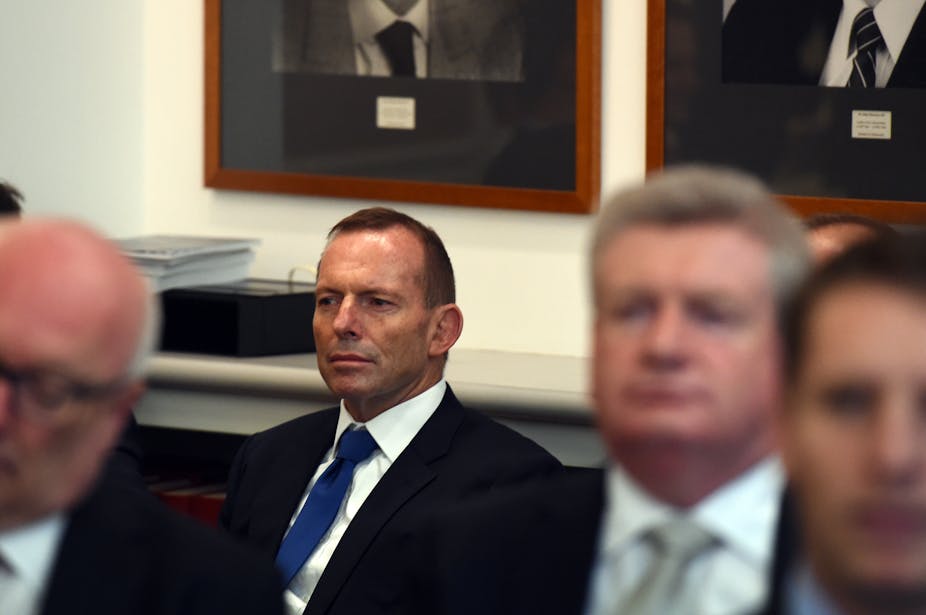On Monday, a scarifying account of Tony Abbott’s prime ministership appears in the bookshops. By journalist Niki Savva, The Road to Ruin: How Tony Abbott and Peta Credlin Destroyed Their Own Government will paint a graphic picture of political disaster.
In recent days we’ve seen Abbott step up to an intense level of activity. A 4000-word essay for Quadrant defending his government. A well-publicised dinner with Japanese Prime Minister Shinzo Abe, and effective endorsement of Japan’s bid for the submarine contract. Condemnation of the Safe Schools anti-bullying program in media comments.
And, most significant of all, an intervention in the tax debate at Tuesday’s Coalition partyroom meeting – the first time since losing the leadership he has weighed in at that forum on policy.
Some around the government see a link between the imminent appearance of the Savva book and what Abbott is doing – an attempt at putting his version of the past and seeking, to the extent possible, to erect firewalls. Regardless of whether they’re right, Abbott’s decision to inject himself into the tax debate has significant implications for Malcolm Turnbull.
Abbott is not a threat to Turnbull. But in the context of the volatile tax issue and a vociferous backbench, the amplified voice of a former leader is unhelpful.
Consider where Turnbull is on tax. With the GST change now overboard, he has had to retreat to a modest package. Options still on the table include trimming superannuation concessions, tightening negative gearing, and overhauling deductions, with proceeds used for limited income-tax cuts.
Given previous expectations about reform, many would find the result disappointing even if the government took up all these options. But some backbenchers are pushing back hard especially on negative gearing, buttressing their case by the argument – with obvious attractions for Turnbull – that it is easier to demolish Labor’s policy if the government stays with the status quo.
That was a point Abbott made strongly in the partyroom, when he endorsed the view of a colleague who had expressed discomfort about talk of capping negative gearing.
According to the regular post-meeting briefing, Abbott reminded the partyroom of “two truisms” – that “we don’t have a revenue problem, we have a spending problem”, and “you can’t reduce taxes by raising taxes”. He said Turnbull in parliament had “brilliantly” destroyed the ALP’s tax proposals. But the corollary, he warned, was that the Coalition could not go down the same path itself – or its words would come back to haunt it.
Abbott instead urged the government go down the savings path; savings were very difficult, as the 2014 budget showed, “but we have to revisit that task”.
In another burst of wicked flattery, he said that with Turnbull’s communications skills and the new team, “this can be done and this is the challenge”. “We’re a low-taxing, small-government party, and these are the fundamentals for the cabinet to consider as we finalise the tax package.”
In a return of mutually insincere compliments, Turnbull said leadership was about both continuity and change, and many of the things the Turnbull government was doing represented continuity from the leadership shown by Abbott. He told Abbott that “Scott Morrison and I are completing the process of looking right across the board in our review of the tax system, which you and Joe Hockey started … continuing the process that you, Tony, so openly and courageously began.”
Turnbull finished by congratulating Abbott for opening up the tax debate. It was convenient to overlook that Morrison only recently said that when the new team came in, work had to start on a plethora of options which had been previously taken off the table.
One of those was negative gearing, which Abbott had not wanted touched, despite the inclination of Hockey. At least Abbott is being consistent in saying it should be protected, albeit either disingenuous or weak-headed in suggesting the new salesmen could sell extensive spending cuts before an election.
On negative gearing, the government has turned mute. Morrison is on record about its “excesses”. But Turnbull declined to be drawn on what they are, as the opposition pursued him on Tuesday. The normally imperturbable Finance Minister Mathias Cormann was uncomfortable when pushed on excesses. “The treasurer can talk for himself. I am the finance minister – I look after the expenditure side of the budget.”
Earlier at the party meeting, Morrison, still desperate to get enough money to address – even in a small way – bracket creep, said: “When it comes to tax policy we are dancing on the top of a pin head. We have very few options. There is no burden-free decision in the tax debate. If you choose not to act, you will nevertheless be acting by default and increasing the income tax rate through bracket creep.
"Let no-one think that doing nothing on the tax debate is without consequences.”
A frustrated Morrison might feel he’s on a pin head. For Turnbull – with Tuesday’s Essential poll joining Newspoll in having the Coalition and Labor tied on 50-50 – it feels more like a barb-wire fence.

